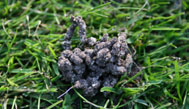Autumn = Worms
20 Sep 2012

Worm casting season is here! What can be done to help with this problem?
Excessive earthworm casts are a significant problem on golf courses, bowling greens and sport fields in the UK causing disruption, effecting the playability, aesthetics, and maintenance of playing surfaces.
Casting occurs when worms deposit soil from their burrows as small mounds, called casts, on the surface. These casts adversely affect ball roll especially on greens, and muddy and smother the grass when smeared or compacted by tyres, machinery or foot traffic.
In the UK there are approximately 28 species of earthworm, of these only three or four cast on the surface. The two most common are Lumbricus Spp. and Allolobophora Spp. these nocturnal worms have been known to help lessen soil compaction and provide passageways through which air and water can move, which can enhance the penetration and growth of plant roots.
However excessive populations of casting worms have made the maintenance of high quality sports surfaces a problem. Going back twenty to thirty years ago, there were various products on the market to help maintain surfaces such as Chlordane, Sydane, Tornado, Arsenate of Lead, Castaway Plus, Twister Flo and Mildothane. These since have all been removed from sale due to many of them causing persistent levels of active ingredient residues in the soil. These residual levels have now been depleted which has caused the significant increase in earthworm numbers.
How to reduce earthworm populations?
The best way to help ease the problem of excessive earthworm populations is to mix cultural and chemical practices.
Cultural
Acidifying Fertiliser
By reducing surface pH this will discourage earthworms from surfacing and producing casts. Eg. A fertiliser with sulphate of iron (Ammonium Sulphate) and Iron. (Various types available)
Thatch Reduction
By reducing thatch you are helping to minimise the earthworm's food source eg. Terralift T-Thatch
Drier Surfaces
Encourage surface drainage through aeration and verticutting etc. and possibly look at any drainage issues eg. Terralift Rocastem
Chemical
Insecticide
An application of Carbendazim (Ringer) this product works in the surface where only the casting worms will come into contact with the product. The worms are required to ingest the product for it to be successful. The product is best applied when the soil is moist as penetration into the soil profile is critical. The larger the volume of water applied or heavy rainfall at or after application will further increase the products efficacy.
Penetrant
A penetrant adjuvant (Scuba) can be added to aid the product to get through any thatch or fibrous material.
Water Buffering
Carbendazim is very sensitive to areas with hard water (High pH). The addition of a water buffering agent (Assist) can further increase the products activity and prolong its spray time window.
Suggested products:-
Assist - Water Buffering Adjuvant
Terralift T-Thatch - Rapid thatch and organic matter breakdown
